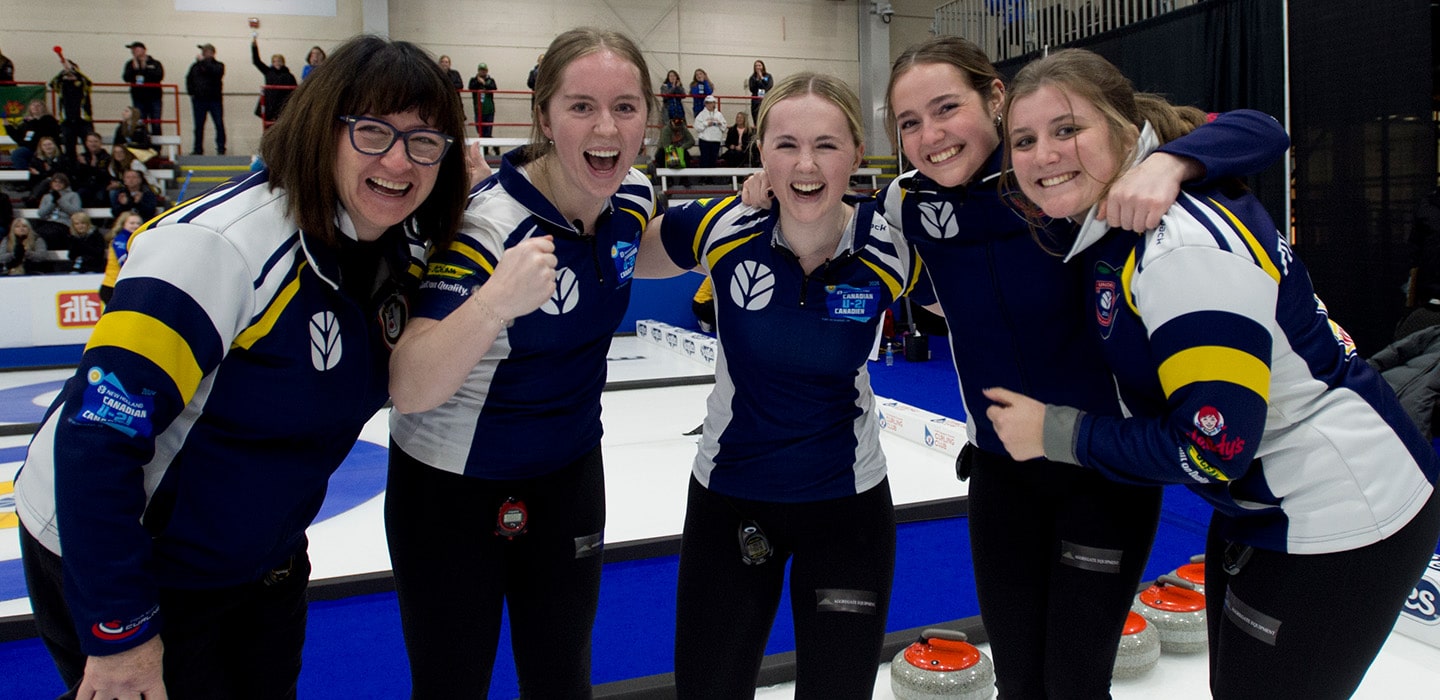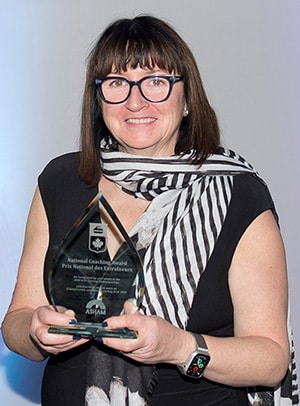Gender Equity in Coaching Survey

Input needed from curling coaches and athletes to maximize efforts in support of developing women coaches in curling
Theresa Breen started her journey as a curling coach four years ago. When she looked around the rinks while coaching her Under-21 team, she couldn’t help but notice how few women were in coaching roles in her home province of Nova Scotia and how even fewer were sitting behind the benches at national championships.
Now, with more awareness focused on fostering greater female participation in coaching roles in curling, Breen is starting to see an uptake of women in these spaces. Breen believes that when women are visible in coaching situations and roles across Canada, it is easier for other females to see themselves playing a leadership role.
“I think many women realize this is something they should consider doing. I think there’s an opportunity for female curlers to discover this is a viable option to continue in different aspects of curling, and I think they’re starting to embrace that,” said Breen, who coaches Team Ally MacNutt of the Halifax Curling Club.
This awareness is at the forefront of curling discussions due to the work of the Women in Curling Leaders’ Circle (WCLC). The group is a collective of Canada’s dedicated and dynamic female sports leaders who want to grow the number of females in the sport at all levels, from girls trying the game through the Girls Rock program to personal and professional development initiatives that offer women meaningful opportunities to network and develop their skills for futures in all aspects of curling, including coaching.
Curling Canada received a two-year Gender Equity-Equity Diversity Inclusion grant from the Government of Canada to support multiple initiatives from 2023-25. One key area of focus is discovering new ways to increase female coaching participation in curling by better understanding the current gender gaps and the barriers to participation in curling’s sport system. The grant provides over $32,000 specifically to support the creation of new programs and initiatives that will increase female coaching involvement.
The WCLC has prepared a preliminary survey to better understand the barriers females face in the coaching world. The goal is to determine why there are fewer women coaches at all levels of the sport, from Little Rocks and grassroots to high performance, and how Curling Canada can support women in coaching roles and introduce new women coaches to the game at all levels.
“We are trying to understand what is holding women back from becoming coaches or coaching at higher levels,” said Jennifer Ferris, Sport Safety and Education Officer for Curling Canada. “We’re hoping to identify areas where female coaches have either perceived or actual knowledge gaps. Then we’ll develop programming, education or messaging to help bridge those gaps.”
The WCLC calls on all coaches and athletes of all genders and all levels of the sport to provide feedback through a survey to better understand gender equity issues in curling coaches.
COMPLETE THE UNDERSTANDING GENDER EQUITY ISSUES IN CURLING COACHES SURVEY BY JUNE 30:
Men make up 68 per cent of Canadian curling coaches, compared to 32 per cent of female curling coaches. By participating in the survey, WCLC and Curling Canada will use the findings to create programming and support mechanisms to help women coaches develop in the sport and guide provincial/territorial Member Associations on recruiting, developing and training women coaches.
Breen, Vice President of Nova Scotia Curling’s Board of Directors, has been working closely with the organization’s technical director, seven-time Scotties Tournament of Hearts participant Jill Brothers, to bring more awareness to female-led coaching in the province. Over the years, she’s seen that increase and advocated for this area’s development provincially and nationwide.

She took her first coaching course in 1999 while competitively curling with Ontario’s Anne Merklinger. She also made the podium three times at the Scotties Tournament of Hearts, earning silver in 1998 and 2000 and bronze in 1993. However, between competitive curling, work, and family, Breen wasn’t in a position to coach a team. Now retired and living in Nova Scotia, she still curls in seniors and has taken on coaching.
“I think a lot of curlers don’t totally appreciate all that goes into coaching and the education process and the continuing education process behind it. I think one thing that I’ve learned to truly appreciate is the amount of work and preparation that the coach requires to assist the team. I’m a lifelong learner, so I love that aspect of it, and that’s what I was looking for, to try something new where I could keep learning as well,” Breen said.
It’s almost a full-time job, but it has come with lots of success. Team MacNutt (skip MacNutt, third Maria Fitzgerald, second Alison Umlah and lead Grace McCusker) won the 2024 New Holland Canadian Under-21 Curling Championships, staged in Fort McMurray, Alta., and will represent Canada at the 2025 World Junior Curling Championships. Breen relishes working with these young women as they achieve their goals while also serving as a role model for them, even though she’s learning just as much from the players on her team.
“I also learn from the athletes, and this is a whole new generation of curlers to work with. You have to work as a team, and the players and coach all bring different perspectives, and we all continue to learn from each other,” Breen said. “It’s really important to see other women as role models, create awareness, and encourage each other to try curling or coaching. More communication and talking about it creates more awareness. There are so many curlers out there, so if we can convert more of them into coaches over time, the sport will continue to benefit and grow.”
The 2024-25 season will be memorable for Canada’s Team MacNutt as they make some memories that will last a lifetime. When the team looks back on it, they can remember a female coach who aided it and perhaps inspired them to serve as coaches and mentors to continue giving back to women in the game.
This project has been made possible in part by the Government of Canada.






